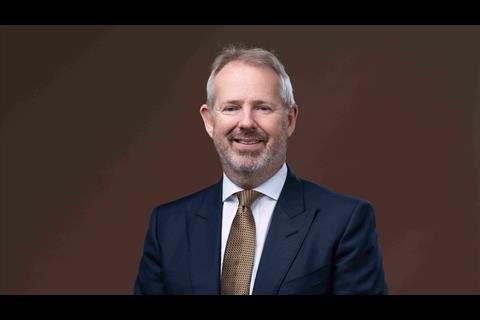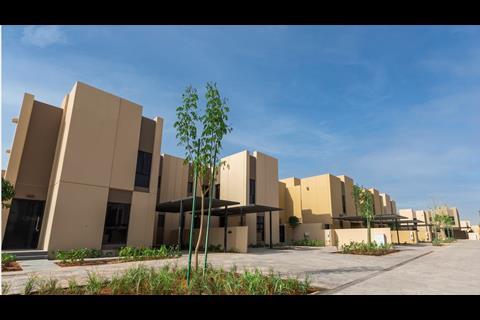With five massive projects on the go, the company is a major contributor to Saudi housing targets and is bringing its ‘open community’ approach to the region
Saudi Arabia’s sovereign wealth fund, PIF, has been hitting global headlines particularly in the world of sport, most prominently golf and football.
LIV Golf/ the PGA Tour/DP World Tour merger, PIF’s ownership of four of the leading Saudi Arabian football clubs including Al-Nassr where Christiano Ronaldo now plays, plus Newcastle United of the English Premier League are just some of PIF’s investments, with MMA fighting and a rumoured move into professional cycling being more recent headlines.
But Saudi Arabia’s main investment arm is also behind some of the biggest real estate developments in its domestic market.
In September, PIF’s newest giga-project developer, Roshn, was named Best Developer in the GCC region by influential trade magazine, Construction Week, which measured the value of completed projects, the value of projects under construction, the value of recently awarded contracts, and the company’s commitment to Corporate Social Responsibility and sustainability.
Roshn fits in with PIF’s overall objective to make long-term investments that can make an impact within its borders but also on a global stage in line with the nation’s Vision 2030.
Having launched five projects since its inception, Roshn is now a major contributor to meeting the Saudi government’s target of 70% home-ownership by 2030. The company is behind a plan to create 400,000 homes in no fewer than nine cities.
Its most ambitious project is the 20 million m2 Sedra community looking to supply 30,000 homes and whose first phase completed in 2021, delivering houses ahead of schedule, and thus becoming the Kingdom’s first giga-project to deliver to customers.
The rest of its projects are big too. It is developing the 4 million m2 Alarous in Jeddah, while Warefa in Riyadh aims for 1.4 million m2, and Alfulwa in Al Ahsa 10.8 million m2. Marafy is the latest scheme, a 2 million m2 mixed development featuring the Kingdom’ first canal project connected to the Red Sea around 52,000 residential units.
By 2030, Roshn will develop almost half a million homes, as well as 1,000 kindergartens and schools, and over 700 mosques.
Crown Prince Mohammad bin Salman bin Abdulaziz Al Saud, prime minister of the Kingdom, who is credited with the impetus behind the ambition of the country, is on the board of directors. The rest of the board is comprised of other eminent Saudis.
However, similar to other giga-project developers, Roshn’s CEO leading day-to-day operations is a westerner; David Grover was previously CEO of Mace Developments in the UK which worked on massive projects such as the London 2012 Olympics and the Shard at London Bridge. He arrived at Roshn in 2019 as it rebranded from being the Community Development Company (CDC).
City and urban approach In an interview with PropertyEU, Grover explains how Roshn’s ‘walkable community developments’ are abnormal for the traditional Saudi market, where homes are typically beautiful on the inside yet hidden behind high walls and only accessible by car creating the effect of private compounds.
Grover says Roshn is creating ‘open’ communities with a public realm and all the amenities in a way never before seen in the country. The name Roshn itself is partly derived from ‘Roshan’, the Arabic term for a type of ornate wooden window allowing privacy, light, and ventilation in one go, giving an idea of the aspiration of the firm’s projects.
‘What we are now doing is very community-focused rather than having the high walls concept,’ says Grover. ‘A key component is to try to get people out of their cars. Health and wellbeing are a big part of Saudi’s Vision 2030 given the population is not very healthy. Diabetes rates are the highest in the world because people don’t walk, and the diet is poor with instant food delivered to the door. Going to the gym has not been popular either. But things are opening up and we are part of that; we are using the expression “Live Beyond Walls”’.
With much scepticism that Saudi Arabia will complete its hugely ambitious giga-project programme, Roshn has already become the first to finish a phase. And, a month ago it reached a milestone of having sold SR 12 bn (€3 bn) of new homes to Saudi nationals. Says Grover: ‘We have effectively paid back all the equity from PIF. We are the first giga-project to do that.’
The company has secured another SR 10 bn (€2.53 bn) from three local banks for a revolving credit facility though it has enough money at the moment from its sale receipts.
Returning to the theme of openness in its communities, Grover says there is huge demand for new housing among Saudi’s youthful population. He explains: ‘There has been a mood change driven by the Crown Prince and the government for a more open lifestyle. Saudis have been very conservative, but the younger generation who has perhaps been abroad or on Instagram want change, which has been supported.’
For the moment, only Saudis are allowed to buy residential property, but the KSA is working up plans to open home ownership to foreign nationals quite soon.
Prices of new homes in the Kingdom are a lot cheaper than in many parts of Europe and about level with those in Dubai, which is far ahead of the KSA in terms of development. Prices are in the range of SR 1.5 – 3.5 mln (€377,000 - €890,000). Some of the biggest villas measure 5,000 ft2 - complete with extras such as a maid’s room, roof terrace, and BBQ.
The belief is that a masterplan for a community cannot only have homes. It must have retail, schools, civic defence such as police and fire stations, and plenty of greenery. Roshn is busy installing a million-and-a-half trees and 60 million plants and bushes at its projects. It has such demand for trees that it recently started growing its own via nurseries.
Meanwhile, its new app will be available to a customer base of around 3 million people in the next five years. From their phones, customers will be able to do everything required, from finding a home and buying it, to paying bills and controlling air conditioning units.
The communities will also have e scooters and e-bikes, while EV charging points are going into all homes.
Water and solar energy challenge One of the biggest challenges is water. Desalinated water gets pumped in via massive pipes from Saudi’s east coast. Roshn is confident about the sustainability of recycling water back into its communities thanks to the equipment and products installed.
At the same time, there is not enough solar panel surface area on the roofs of homes to supply all of the air con systems. The company is thinking of using the roofs of car shades/ports at the cheaper homes that don’t have garages to help meet supply requirements. When out during the day, people will be able to control the air con in rooms in their homes to cut waste.
Already, Grover says Roshn developments are around 20% more efficient in power and water use than Saudi’s new code on building sustainability.
But residential is just one part of the game plan at Roshn, which has ‘morphed’ from being a housing developer to a mixed-use developer thanks to an enlarged mandate.
In total, the company has 200 km2 of land, and sometimes turns away parcels of additional land from various ministries when they are not suited for the uses Roshn has in mind. When it is lucky, it gets the land it has applied for or buys developed sites. Last December, it acquired the 80,000 m2 Riyadh Shopping Front, comprising an 80,000 m2 mixed-use shopping mall, and Riyadh Business Space, also 80,000 m2 for the likes of KPMG and Deloitte and with hotel, 1km of walking promenade, fitness centre, conference halls and a nursery all adjacent to its Sedra holdings.
Plans for growth seem almost limitless. Soon, it will launch a Build-to-Rent platform with ambitions to quickly become the largest BTR development company in Saudi Arabia. At the end of the year, it will start construction on the first 2,500 units. And a chain of Roshn-branded gyms is on the way too.
This is what the future of urban living and mixed-use development looks like in a country that is arguably the world hot spot for development right now.
Grover feels the scepticism of KSA delivering giga-projects. When he returns to Europe, he says: ‘I always ask, “Have you been to Saudi Arabia?” If you haven’t, how can you have an opinion?”’












